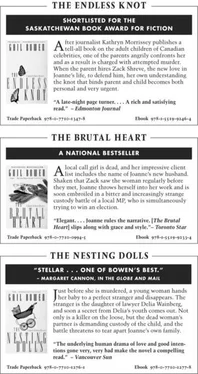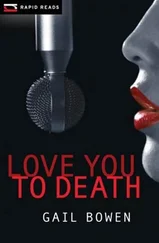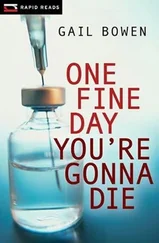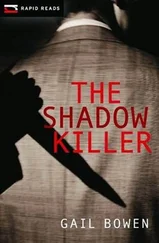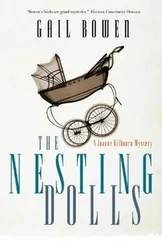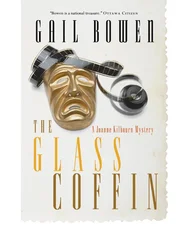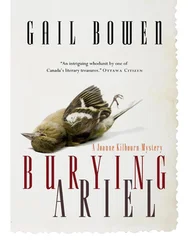Gail Bowen - The Endless Knot
Здесь есть возможность читать онлайн «Gail Bowen - The Endless Knot» весь текст электронной книги совершенно бесплатно (целиком полную версию без сокращений). В некоторых случаях можно слушать аудио, скачать через торрент в формате fb2 и присутствует краткое содержание. Жанр: Старинная литература, на английском языке. Описание произведения, (предисловие) а так же отзывы посетителей доступны на портале библиотеки ЛибКат.
- Название:The Endless Knot
- Автор:
- Жанр:
- Год:неизвестен
- ISBN:нет данных
- Рейтинг книги:5 / 5. Голосов: 1
-
Избранное:Добавить в избранное
- Отзывы:
-
Ваша оценка:
- 100
- 1
- 2
- 3
- 4
- 5
The Endless Knot: краткое содержание, описание и аннотация
Предлагаем к чтению аннотацию, описание, краткое содержание или предисловие (зависит от того, что написал сам автор книги «The Endless Knot»). Если вы не нашли необходимую информацию о книге — напишите в комментариях, мы постараемся отыскать её.
The Endless Knot — читать онлайн бесплатно полную книгу (весь текст) целиком
Ниже представлен текст книги, разбитый по страницам. Система сохранения места последней прочитанной страницы, позволяет с удобством читать онлайн бесплатно книгу «The Endless Knot», без необходимости каждый раз заново искать на чём Вы остановились. Поставьте закладку, и сможете в любой момент перейти на страницу, на которой закончили чтение.
Интервал:
Закладка:
But Howard’s misery was not paramount in my mind as I banged at his door. When finally he appeared, unshaven and in need of a shower, I was mad enough to spit. He was wearing the kind of plaid flannel shirt his campaign manager had tried, without success, to get him to wear when he ran against a candidate who radiated a down-home charm that was as ersatz as it was potent.
There was no down-home charm in Howard’s greeting. “You never give up, do you, Jo? Does the fact that I didn’t answer the doorbell suggest anything to you?”
I thrust the pie into his hands. “I brought you something for Thanksgiving.”
He sniffed. “What happened to the Crown Royal?”
“I’m being innovative.”
He gazed at me through a rheumy eye. “Thank you for the innovative pie,” he said. Then he stepped back and attempted to kick the door shut with a slippered foot.
I stopped it with my elbow. “I’m coming in for a visit,” I said.
“Suit yourself,” he said. Then, pie in hand, he turned and padded down the hall towards the kitchen. Left to my own devices, I wandered into the living room. The gloom was sepulchral. Heavy drapes banished the light of the outside world, but not its concerns. Three televisions tuned to three separate cable channels brayed news of the latest public incidents of malice, malfeasance, and misfortune. The vinyl La-Z-Boy the caucus office bought Howard when he’d retired eleven years earlier was at the ready. A crocheted afghan lay crumpled on its seat and a glass of amber liquid rested in the indented beverage holder in the recliner’s arm. I didn’t need to sniff the liquid in the glass. The smell of its predecessors lingered in the air. The coffee table was littered with half-filled takeout cartons from Bamboo Garden, leaking plastic sleeves of soy and plum sauce and soiled and balled-up paper napkins. Home, sweet home.
I turned off the televisions and began picking up garbage and carting it out to the kitchen. Howard watched wordlessly as I dropped the detritus of his meal into the trash, but when I washed my hands and returned to the living room, he followed me. I ignored him. I was a woman on a mission. I opened the curtains and sunshine filled the room.
Howard narrowed his eyes and growled like an aged and pissed-off lion. “What the hell do you think you’re doing?”
“Improving the feng shui,” I said. “Your environment is working against you.”
He shook his head. “Jeez, I knew it must be something.”
“Say the word and I’m out of here. It’s a holiday weekend. I have errands to run.”
He glared at his slippers. “Stay,” he said.
“My pleasure,” I said. I grabbed the afghan to give it a shake and a copy of Too Much Hope fell from its folds. The book bristled with Post-it notes. The thought of Howard sitting in this darkened living room poring over Kathryn’s book by the flickering light of his three televisions infuriated me.
“Why do you keep this thing around?” I asked, pitching the book at the La-Z-Boy.
His drink threatened, Howard sprang into action. He retrieved his glass from the beverage holder and drained it. “To remind me,” he said.
“Of what?”
“Christ, Jo, why do you always have to force the issue? To remind me of how stupid I am. To remind me of what I buggered up.”
He poured himself a refill.
“Good move,” I said. “How come none of the self-help books suggest liquor and wallowing as tools for recovery?”
Howard’s voice was gravel. “Because the bozos who write them lack imagination. Come down to my office.” He wandered out of the kitchen and I followed. I didn’t need directions. When Howard had moved into the condo, I’d helped him convert his guest room into an office suitable for an éminence grise. It was a pleasant space, with photographs of the old days discreetly placed to remind people that Howard was a person of consequence, and a new notebook computer and printer to suggest he was moving with the times.
I glanced around. “So what did you want to show me? Everything’s the same.”
Howard’s gaze was shrewd. “You always were observant,” he said. “That’s exactly what I wanted you to see. Nothing’s going on. There’s not a goddamn thing in my life except a bunch of pictures to remind me of a time when I was useful.”
“You’re still alive,” I said. “You have options. You enjoyed teaching. Call our department head. He’d be thrilled to have you teach a class next semester.”
“How much respect do you think I’d get from students after what I did?”
“Howard, students don’t care about our private lives. We’re a means to an end for them. By the time the winter semester starts, Kathryn Morrissey will be old news.”
“Not for me,” Howard said. “Kathryn Morrissey will be an anchor around my neck forever.”
“Well, you put her there,” I said. “You knew what Kathryn did for a living when you moved in next door to her. I’ve heard you warn dozens of people against blabbing to journalists. What made you open up to her?”
“Marnie’s death,” Howard said simply.
“Not good enough,” I said. “Marnie would have killed you for spilling the family secrets to a reporter.”
“You’re still angry at me for what happened to Marnie, aren’t you?” Howard said.
“I was never angry at you,” I said. “I was angry at God. There’s a difference.”
Howard’s lip curled. “Thanks for reminding me.”
“You’re welcome. Anyway, it’s a moot point. Marnie’s dead, and she died believing she was going to a better place.”
“But you don’t believe that.”
“I just wish she’d had a chance to spend more time here.”
“So do I,” Howard said.
“Her death was unacceptable,” I said, as in fact it had been.
After devoting her life to raising a family, writing speeches, making cabbage rolls, and shaking hands, Marnie Dowhanuik told Howard it was her turn, said goodbye, and enrolled at the Centre for Medieval Studies in Toronto. Challenged and for the first time praised for her brilliance, Marnie had flourished. She read far into the night, argued over coffee with the other students, and rode across campus on her new Schwinn. One soft spring day, when Marnie was on her way to class, her bike was hit by a car carrying a provincial cabinet minister to a meeting in Queen’s Park. The class she was headed for was on the literature of the Antichrist.
Marnie had a penchant for black humour. The fact that, in the end, the Antichrist had used a politician to kill her would have called forth her wonderful dirty, raucous laugh. But the punchline of Marnie’s story was a long time coming. She didn’t die on that day when the air was sweet with the smell of fresh-turned earth and crocuses. Instead, she was picked up by an ambulance and carried to a hospital where good and caring doctors had to face the fact that, try as they might, they couldn’t put Marnie together again. Her body healed, but Marnie herself was irrecoverable. She was sent to a nursing home where the nuns did their best: curling her hair, putting blush on her cheeks, and dressing her in velour track suits in the pastel colours that Marnie despised. Finally, her body was assaulted by an aggressive cancer that carried her away in less than six months. Many thought it was a blessing.
At the memory of Marnie, Howard’s eyes lost their focus. “I was there when she died, you know. They kept her doped up, but just before she died she came out of the haze. She knew me. She gave me that wicked smile. Then she said, ‘Babe, I’d like to stay, but I have a meeting.’ ” His face crumpled. “The excuse I’d given her a thousand times.”
My throat tightened.
“I had it coming,” Howard said thickly. “Still it’s not the farewell you hope for from your wife of forty years. Anyway, the guilt kicked in, and I wasn’t about to unburden myself to some priest, so when Kathryn asked me about myself, I let it rip – told her I was a lousy husband, a lousy father, a lousy friend, a lousy human being. Probably my antennae should have gone up when she started pressing me about Charlie, but hell, out of the multitudes, he was the one I’d failed the most.”
Читать дальшеИнтервал:
Закладка:
Похожие книги на «The Endless Knot»
Представляем Вашему вниманию похожие книги на «The Endless Knot» списком для выбора. Мы отобрали схожую по названию и смыслу литературу в надежде предоставить читателям больше вариантов отыскать новые, интересные, ещё непрочитанные произведения.
Обсуждение, отзывы о книге «The Endless Knot» и просто собственные мнения читателей. Оставьте ваши комментарии, напишите, что Вы думаете о произведении, его смысле или главных героях. Укажите что конкретно понравилось, а что нет, и почему Вы так считаете.
